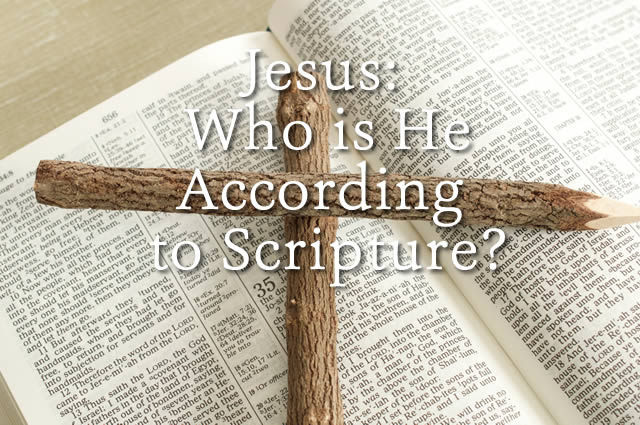In any discussion of Christian theology, no doctrine demands, or deserves, greater attention than the identity and work of Jesus. In 2 Corinthians 11:4 we read of the possibility of “another Jesus” being preached rather than the Biblical Jesus. Therefore, it is imperative that we “make sure of all things, hold fast to that which is fine (1 Thessalonians 5:21 New World Translation).
Jesus tells us the importance of knowing His identity in John 8:24 where He said, “For if you do not believe that I am he, you will die in your sins” (NWT).
This study was prepared in the hope that you would search the Scriptures diligently to find out for yourself what they tell us of Him Who is the foundation of our faith (1 Corinthians 3:11).
Though it is impossible for the finite mind of man to comprehend the infinite nature of God, we can grasp to a sufficient degree what God has revealed of Himself. “The things concealed belong to Jehovah our God, but the things revealed belong to us and to our sons to time indefinite, that we may carry out all the words of this law” (Deuteronomy 29:29 NWT).
One of the “things revealed” to us are the concepts of Jesus as the Son of God, and the Son of man. He is one of the three Persons of the Godhead, a separate and distinct Person from the Father and the Holy Spirit. Thus Jesus is not the Father as some have misunderstood Christians to teach. In coming to earth as He did He laid aside His eternal glory and power (Philippians 2:5-8) so that He could identify with humanity (Hebrews 2:9-18). However, we must never forget that He is “from everlasting” (Micah 5:2), God manifest in the flesh (1 Timothy 3:16), and “God with us” (Matthew 1:23).
He is God with all the attributes of eternal deity, yet He limited His power and glory and took upon Himself a second nature, humanity, with all the limitations which that involved, but without our sin nature. He was the Son of God in that He was begotten of the Father. But, He was also the Son of man in that Mary was His mother, and He received His human nature from her. Thus He is the God-man (Matthew 22:41-46).
The Biblical foundation of the above description of Jesus is demonstrated by the following outline. Keep it in your files for future reference and witnessing.
I.The Son is a separate Person from the Father.
John 1:1 the Word was with God.
Acts 7:55 Jesus standing on the right hand of God.
II.The Son is eternal
Isaiah 9:6 Eternal Father (NWT) [Note: means Father of eternity].
Micah 5:2 from everlasting.
III. He is called God
Matthew 1:23 Emmanuel, … God with us.
John 1:1 the Word was God [i.e., deity].
John 5:18 Jesus is equal with God.
John 8:58 Jesus, the I Am.
John 10:30-33 Jesus and the Father are “one.”
John 20:28 My Lord and my God.
Col. 2:9 all the fullness of the Godhead.
Titus 2:13 the Great God and Savior
Hebrews 1:8 Thy throne, O God, is for ever.
1 John 5:20 This is the true God.
IV. He is described in terms reserved only for God.
Creator of All Things
John 1:3; Ephesians 3:9; Colossians 1:16,17; Hebrews 2:10; Isaiah 44:24 (note the words ‘alone,’ ‘by myself’. How could the Creator of All things be a created thing?)
Almighty
Revelation 1:8 with 21:5-7; 22:12, 13, 16, AND 20.
Mighty God
Isaiah 9:6 compared with Isaiah 10:20, 21 (Both Jesus and Jehovah are called “the mighty God.”)
First and Last
Revelation 1:17; 2:8; and 22:13. Compare Isaiah 44:6
Exact Likeness of God
Hebrews 1:3; John 12:45 and 14:9. Compare Isaiah 46:9
V. Jesus is Worshipped (See Luke 4:8)
Hebrews 1:6 Let all God’s angels worship him. (NWT)
Revelation 5:11-14 All creatures worship the Lamb.
(See also, Matthew 14:33; 15:25; 20:20; 28:9, 17 and Luke 24:52)
VI. Jesus is Jehovah as proven by cross-referencing the Old Testament and the New Testament.
The Watchtower’s New World Bible Translation Committee has inserted the name “Jehovah” in the New Testament at 237 places. No other translation has done so. Their ‘rule’ for determining where the divine name should be used is found on page 18 of their Kingdom Interlinear Translation. It says,
“How is a modern translator to know or determine when to render the Greek words ‘Kyrios’ and ‘Theos’ into the divine name in his version? By determining where the inspired Christian writers have quoted from the Hebrew Scriptures. Then he must refer back to the original to locate whether the divine name appears there. This way he can determine the identity to give to ‘Kyrios’ and ‘Theos’ and he can then clothe them with personality.”
Fairness and honesty requires that the following Scriptures be considered in the light of the Watchtower’s own rule.
Isaiah 45:23 “I have sworn by myself, the word is gone out of my mouth in righteousness, and shall not return, ‘That unto me every knee shall bow, every tongue shall swear’.”
Compared with…
Philippians 2:10, 11 “That at the name of Jesus every knee should bow, of things in heaven, and things in earth, and things under the earth; And that every tongue should confess that Jesus Christ is Lord, to the glory of God the Father.”
Many other such comparisons are available for you to study: Here are a few.
Psalm 102:24-27 compared with Hebrews 1:10-12 (see also Isaiah 44:24).
Isaiah 40:3 compared with John 1:23 and 3:28.
Isaiah 6:1-10 compared with John 12:37-41.
Joel 2:32 compared with Romans 10:9-13 (vs. 13 refers to the “Lord” of vs. 11. See also 1 Corinthians 1:2).
1 Kings 8:39 (note the word “alone”) compared with Revelation 2:23.
Isaiah 8:13 compared with 1 Peter 2:7,8.
Zechariah 12:10 compared with John 19:34-37.
Psalm 23:1 compared with John 10:11
Isaiah 40:9-11 compared with Revelation 2:23 and 22:12, 13 and 20.
Malachi 3:1 compared with Matthew 11:10
Psalm 45:6, 7 compared with Hebrews 1:8, 9.
Exodus 3:14 compared with John 8:58, 59.
Isaiah 60:19 compared with Luke 2:30-32 and Revelation 21:23.
Isaiah 42:8 compared with John 17:5 and 1 Corinthians 2:8.
Psalm 110:1-5 Jehovah (Jesus) at the right hand of Jehovah (Father) compared with Revelation 19:11-21.
VII. Jesus is God Made Flesh. Matthew 22:41-46.
Philippians 2:5-8
Jesus “being in the form of God” (i.e., deity), did not consider it something to cling to, but emptied Himself of His divine prerogatives and power, not His divine nature, and took upon His divine nature “the form of a servant” (i.e., humanity), in order to suffer death on our behalf.
John 1:1 & 14
“In the beginning was the Word and the Word was with God (i.e., the Father and Holy Spirit), and the Word was God (deity).” “And the Word was made flesh and dwelt among us.”
Hebrews 1:3
Jesus is the visible manifestation of God (John 14:9), the reflection of God’s glory (see Isaiah 42:8), and the exact impression of His substance, or nature. Please note, no finite creature could be so likened to the infinite God (Isaiah 46:9).
Hebrews 2:10
Jesus set aside His infinite glory to be one of us. He Who is eternal deity became man for the suffering of death so that the horrible debt of sin was paid. He now as a man (though also God) is our Captain to take us as sons of God into glory. The gulf between God and man is now spanned by the God-man. (See also verses 14-18).
Answers to Watchtower Proof Texts –
John 14:28 “My Father is greater than I.”
JW reasoning is that if God is “greater” than Jesus then they can’t be equal.
Just as the President is positionally greater than the Vice President, so the Father is positionally greater than the Son. The President and Vice President are equally human, and the Father and Son are equally divine.
Colossians 1:15 “the firstborn of all creation.” (NWT)
JW reasoning is that “firstborn” means “first created.”
Paul said “firstborn (Greek ‘protokos’), not “first created” (Greek ‘protoktistos’).
Who is the firstborn, Ephraim or Manassah? (Genesis 41:51, 52 with Jeremiah 31:9). Firstborn means “preeminent” over all creation in this context. Compare the use of “firstborn” in other texts (Deuteronomy 21:15-17; Exodus 4:22; and Job 18:13).
Revelation 3:14 “the beginning of the creation of God.”
JW reasoning is that “beginning” means that Jesus was what God created.
We derive the word “architect” from the Greek word “arche,” which is translated “beginning,” “origin,” “source,” “chief.” Jesus is the Creator of ALL things. (Colossians 1:16, 17).
IX. The New World (mis) Translation.
A Greek-English interlinear such as the Kingdom Interlinear Translation, published by the Watchtower, will help you see the NWT errors.
John 1:1 “a god” vs. “God.”
There is no scholar of good reputation who will endorse this rendering. It leads to polytheism. The Watchtower has repeatedly misquoted evangelical scholars to support their error. Why?
John 8:58 “I have been” vs. “I am.”
The Watchtower has said this is in the “perfect indefinite tense” (1950 NWT); the “perfect tense indicative” (Large Print NWT); and the “perfect tense” (KIT). It is not any of the three tenses put forward by the Watchtower. It is in the present tense. There is no “perfect indefinite tense” in the Greek language.
Colossians 1:16, 17 “all other things” vs. “all things.”
Look in the Greek text and see that the word “other” does not appear.
Philippians 2:9 “every other name” vs. “every name.”
Look in the Greek text and see that the word “other” does not appear. What name is above every name?
Conclusion
How could anyone less than almighty deity say as Jesus did, “He that hath seen me hath seen the Father?” But yet Jesus said, “My Father is greater than I.” Aren’t these contradictory statements?
“Suppose you had been on earth when Jesus was here and had heard him make these apparently contradictory statements, and had asked him. And suppose he had said in reply, “My child, what if, for the purpose of your redemption from sin and the curse of the law, I voluntarily laid aside my eternal glory, and suffered myself to be born of a woman, and made under the law, thus limiting my being to the condition of your nature, that I might, in that nature, offer up to God a sacrifice for sin as would enable him to proclaim forgiveness of sins to the whole world? In such a case can you not conceive that there is no contradiction in these sayings of mine? For indeed I am one with the Father, and he that hath seen me hath seen the Father; but for the purposes of the atonement I have voluntarily assumed an inferior position, that I might take your place and die, which I could not have done unless I had taken a subordinate place, yea, and your very nature. Thus I sometimes speak of my eternal relation to God, and sometimes of my relation to him as a messenger of the covenant sent forth to redeem.” (from Taking Men Alive by C.G. Trumbull as quoted by Arthur Wallis in Jesus of Nazareth: Who Is He?)
Have you made Jesus your Lord and Savior? You can if you will confess your sin to God, repent, and trust Him to forgive you. Won’t you do it right now?
By David Henke






